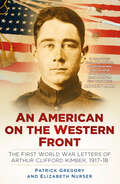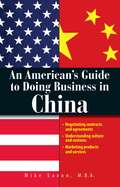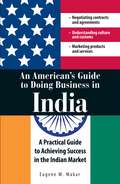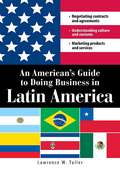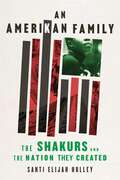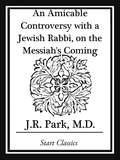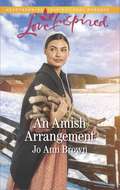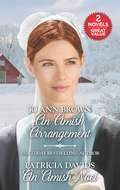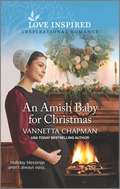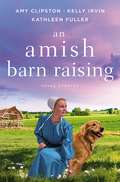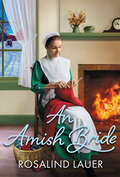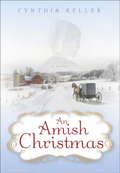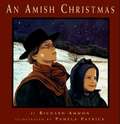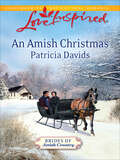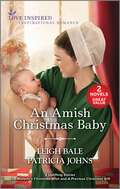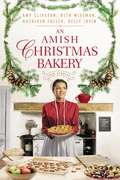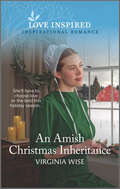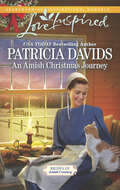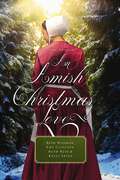- Table View
- List View
An American on the Western Front: The First World War Letters of Arthur Clifford Kimber, 1917-18
by Patrick Gregory Elizabeth NurserThis is the remarkable story of the American First World War serviceman Arthur Clifford Kimber. When his country entered the Great War in 1917, Kimber left Stanford University to carry the first official American flag to the Western Front. Fired by idealism for the French cause, the young student initially acted as a volunteer ambulance driver, before training as a pilot and taking part in dogfights against ‘the Boche’. His letters home give a vivid picture of what Kimber witnessed on his journey from Palo Alto, California to the front in France: keen-eyed descriptions of New York as it prepared for the forthcoming conflict, the privations of wartime Britain and France, and encounters with former president Theodore Roosevelt and Hollywood actress Lillian Gish. Kimber details his exhilaration, his everyday concerns and his horror as he adapts to an active wartime role. Arthur Clifford Kimber was one of the first Americans on the front line after the entry of the US into the war and, tragically, also one of the last to be buried there – killed in action just a few weeks before the end of the war. Here, his frank letters to his mother and brothers, compiled, edited and put in context by Patrick Gregory and Elizabeth Nurser, are published for the first time.
An American's Guide To Doing Business In China
by Mike SaxonDid you know? Americans have bought $185 billion worth of Chinese goods China's economy is growing at an astounding rate of 9 percent a year The trade gap between the U.S. and China has been growing by more than 25 percent per year. Whether you work for a company doing business in China, or are an entrepreneur looking to export your goods and services An American's Guide to Doing Business in China teaches you the practicalities and the pitfalls of dealing with this complex market. While there are undeniable opportunities in the Chinese market there is also a great deal of hype-and very real political and cultural differences that make doing business in China extremely challenging. Written by an industry expert with more than two decades of experience, An American's Guide to Doing Business in China is an authoritative and accessible guide on all aspects of doing business in China. An American's Guide to Doing Business in China gives you the information most relevant to doing business in China on a day-to-day basis including: Finding manufacturing partners; Negotiating contracts and agreements; Choosing a location and hiring employees. This guide also teaches you how to navigate Chinese culture and customs, market and advertise to Chinese consumers, and find the hottest opportunities. An American's Guide to Doing Business in China is what you need to succeed in the world's biggest market.
An American's Guide To Doing Business In China: Negotiating Contracts And Agreements; Understanding Culture and Customs; Marketing Products and Services
by Mike SaxonA Simon & Schuster eBook. Simon & Schuster has a great book for every reader.
An American's Guide to Doing Business in China
by Mike SaxonWritten by an industry expert with more than two decades of experience, An American's Guide to Doing Business in China is an authoritative and accessible guide on all aspects of doing business in China.
An American's Guide to Doing Business in India
by Eugene M MakarDid you know that . . .U.S. money pours into India at a rate of over $25 million every day? India's economic growth has averaged 8.6 percent a year since 2004? At this rate, India will become the fifth largest consumer market by 2025 (up from #12 today)? U.S. venture firms will raise $1 billion for India by the end of 2007? U.S. exports to India have more than doubled over the last five years? China aside, India is the world's most rapidly growing economy. But cashing in on that opportunity can be as challenging as it is rewarding. Whether you work for a company doing business in India or are an entrepreneur looking to export your goods and services, An American's Guide to Doing Business in India will help you navigate all aspects of this complex market. Esteemed industry consultant Eugene M. Makar offers his proven tips, tools, and techniques to help you: Break into the market; Weigh the pros and cons of investments; Find joint venture partners; Hire local representation; and more.You'll also learn to recognize key social and cultural differences. From where to bank to what to wear, you'll discover what makes India different-and how you can best position yourself there for success.
An American's Guide to Doing Business in India
by Eugene M. MakarChina aside, India is the world's most rapidly growing economy. But cashing in on that opportunity can be as challenging as it is rewarding. Whether you work for a company doing business in India or are an entrepreneur looking to export your goods and services, An American's Guide to Doing Business in India will help you navigate all aspects of this complex market. Esteemed industry consultant Eugene M. Makar offers his proven tips, tools, and techniques to help you: Break into the market, Weigh the pros and cons of investments, Find joint venture partners, Hire local representation.
An American's Guide to Doing Business in Latin America
by Lawrence TullerDid you know this?In 2006, U.S. exporters shipped four and a half times as much product to Latin America as to China.Latin America has more than 500 million consumers ready to buy U.S. manufactured goods.Now is the time to enter this emerging new market-but doing business in Latin America is not always easy.In An American's Guide to Doing Business in Latin America, author and international trade expert Lawrence W. Tuller shows you how to determine market risk, select reliable Latin American partners, and use export-trading companies to grow your business opportunities. He also provides up-to-date facts on the politics of the region and U.S.-Latin American relations.Following Tuller's advice, you'll learn how to:Finance exports and direct investmentCreate advertising strategiesPartner with Latin American companiesLatin America is ripe and ready for American business and investment. Are you ready to cash in?This book includes detailed information on:Argentina, Bolivia, Brazil, Chile, Colombia, Costa Rica, Dominican Republic, Ecuador, El Salvador, Guatemala, Guyana, Honduras, Jamaica, Mexico, Nicaragua, Panama, Paraguay, Peru, Trinidad and Tobago, Uruguay, Venezuela
An American's Guide to Doing Business in Latin America
by Lawrence W. TullerNow is the time to enter this emerging new market-but doing business in Latin America is not always easy. In An American's Guide to Doing Business in Latin America, author and international trade expert Lawrence W. Tuller shows you how to determine market risk, select reliable Latin American partners, and use exporttrading companies to grow your business opportunities. He also provides up-to-date facts on the politics of the region and U. S. -Latin American relations.
An American's Guide to Doing Business in Latin America: Negotiating contracts and agreements. Understanding culture and customs. Marketing products and services
by Lawrence W TullerDid you know this?In 2006, U.S. exporters shipped four and a half times as much product to Latin America as to China.Latin America has more than 500 million consumers ready to buy U.S. manufactured goods.Now is the time to enter this emerging new market-but doing business in Latin America is not always easy.In An American's Guide to Doing Business in Latin America, author and international trade expert Lawrence W. Tuller shows you how to determine market risk, select reliable Latin American partners, and use export-trading companies to grow your business opportunities. He also provides up-to-date facts on the politics of the region and U.S.-Latin American relations.Following Tuller's advice, you'll learn how to:Finance exports and direct investmentCreate advertising strategiesPartner with Latin American companiesLatin America is ripe and ready for American business and investment. Are you ready to cash in?This book includes detailed information on:Argentina, Bolivia, Brazil, Chile, Colombia, Costa Rica, Dominican Republic, Ecuador, El Salvador, Guatemala, Guyana, Honduras, Jamaica, Mexico, Nicaragua, Panama, Paraguay, Peru, Trinidad and Tobago, Uruguay, Venezuela
An Amerikan Family: The Shakurs and the Nation They Created
by Santi Elijah HolleyAn Amerikan Family is a light helping us go forward.” — Nikki Giovanni, poetAn enlightening history of the rise and lasting impact of Black liberation groups in America, as seen through the Shakurs, one of the movement’s most prominent and fiercely creative families, home to Tupac and Assata, and a powerful incubator for today’s activism, scholarship, and artistry.They have been celebrated, glorified, and mythologized. They have been hailed as heroes, liberators, and freedom fighters. They have been condemned, pursued, imprisoned, exiled, and killed. But the true and complete story of the Shakur family—one of the most famous names in contemporary Black American history—has never been told.For over fifty years, the Shakurs have inspired generations of activists, scholars, and music fans. Many people are only familiar with Assata Shakur, the popular author and thinker, living for three decades in Cuban exile; or the late rapper Tupac. But the branches of the Shakur family tree extend widely, and the roots reach into the most furtive and hidden depths of the underground.An Amerikan Family is a history of the fight for Black liberation in the United States, as experienced and shaped by the Shakur family. It is the story of hope and betrayal, addiction and murder, persecution and revolution. An Amerikan Family is not only family genealogy; it is the story of Black America’s long struggle for racial justice and the nation’s covert and repressive tactics to defeat that struggle. It is the story of a small but determined community, taking extreme, unconventional, and often perilous measures in the quest for freedom. In short, the story of the Shakurs is the story of America.
An Amicable Controversy with a Jewish Rabbi, on the Messiah's Coming
by J. R. Park"The testimony of Jesus in the spirit of prophecy." Few, perhaps, of those who read the Scriptures are fully aware of the extent to which the language of them abounds in metaphor; yet is this knowledge indispensable to the right understanding of both the Old and the New Testament, and especially the prophetic parts of these books. If Christ be the Messiah, his kingdom is a spiritual one, and what relates to it must be spiritually understood. We marvel at the blindness which prevents the Jews from perceiving in prophecy the numerous intimations of a spiritual Messiah, all of which appear to us to have been distinctly fulfilled in the person of Christ; and yet that very blindness to their spirituality is what prevents ourselves from understanding other prophecies relating to the same subject. The happy state which the world may attain to, under the universal prevalence of true religion, it is more easy to imagine, than to describe; for a volume would hardly suffice to enumerate all the blessings it is calculated to afford. The cessation of foreign war, with all the miseries attending it; the end of all tyranny and oppression at home; of injustice and misrule, are the most distinctly announced, and their benefit perhaps the most obvious. But their influence on society is limited in comparison with the wide diffusion of happiness that would ensue from the improvement in private life, and the amelioration of individual character.
An Amish Arrangement
by Jo Ann BrownThe Farmer’s Instant FamilyJeremiah Stoltzfus hopes the Amish community of Harmony Creek will provide a fresh start…until days before closing on his new farm, he finds a beautiful trespasser. Mercy Bamberger claims the property is hers, promised by her late grossdawdi. Jeremiah can’t turn out the single mom and her daughter, nor can he leave. His solution: temporarily sharing the farm until ownership is settled. Once a city kid adopted by a Mennonite family, Mercy yearns to make the farm a haven for unwanted children. But living beside the handsome Amish farmer has her yearning for everything that’s eluded her…laughter, love and a forever family.
An Amish Arrangement and An Amish Noel: An Anthology
by Patricia Davids Jo Ann BrownFinding Love and Family in Amish CountryAn Amish Arrangement by Jo Ann BrownJeremiah Stoltzfus hopes his new Amish community will provide a fresh start…until he finds a beautiful trespasser on his farm. Mercy Bamberger claims the property is hers, promised by her late grossdawdi. Jeremiah can’t turn out the single mom and her daughter, nor can he leave. His solution: temporarily sharing the farm until ownership is settled. But living beside Mercy soon has him yearning for love and a forever family.An Amish Noel by Patricia DavidsWhen Luke Bowman returns home, Emma Swartzentruber learns her rebellious girlhood crush is gone, and in his place is a handsome man who seems committed to serving the community. Luke’s even agreed to work for Emma’s ill father, whose last wish is to see his daughter wedded to a stable, loving man. And this Christmas, Emma finds that Luke may just be the one to capture her heart for good.
An Amish Baby for Christmas: Amish Christmas Memories A Cowboy Christmas A Christmas Baby For The Cowboy (Indiana Amish Brides #8)
by Vannetta ChapmanHoliday blessings aren&’t always easy… in this novel by USA TODAY bestselling author Vannetta Chapman With a baby on the way… can this struggling widow save her home? In danger of losing her farm after her husband&’s death, Abigail Yutzy needs help—even if she can&’t afford it. At her bishop's insistence, property manager Thomas Albrecht pitches in to aid the pregnant widow. With his troubled past and her shattered heart, their arrangement must stay business only. But their uneasy holiday alliance might just heal both their hearts… From Love Inspired: Uplifting stories of faith, forgiveness and hope.Indiana Amish Brides Book 1: A Widow's HopeBook 2: Amish Christmas MemoriesBook 3: A Perfect Amish MatchBook 4: The Amish Christmas MatchmakerBook 5: An Unlikely Amish MatchBook 6: The Amish Christmas SecretBook 7: The Baby Next DoorBook 8: An Amish Baby for Christmas
An Amish Baby in Her Arms: An Uplifting Inspirational Romance (Amish Chocolate Shop Brides)
by Patricia JohnsA widow reeling from loss… Can the storm deliver her a family? Miriam Yoder thought she&’d never feel happy again after the loss of her husband and unborn child—until a baby is abandoned outside her workplace. Seeing this as an opportunity for her heart to heal, she cares for the helpless infant during a fierce storm with her late husband&’s brother. But Amish farmer Isaac Yoder has been keeping secrets. Hiding them from Miriam as he temporarily works alongside her at his aunt&’s chocolate shop is one thing…but caring for a baby together presents a new challenge. Can their growing connection withstand the weight of the truth and open Miriam&’s heart again?From Love Inspired: Uplifting stories of faith, forgiveness and hope.Amish Chocolate Shop Brides Book 1: An Amish Baby in Her Arms
An Amish Barn Raising: Three Stories
by Kathleen Fuller Amy Clipston Kelly IrvinFrom bestselling authors in the Amish genre come three sweet stories centered around Amish traditions and the possibility of romance. Building a Dream by Amy ClipstonThough they&’ve known each other a long time, Kathryn and Anthony have finally decided to try becoming more than friends—but they are devastated when Kathryn&’s father won&’t allow them to date. He wants his daughter to marry a man with a more respectable job than building gazebos for Englishers. But when Kathryn&’s father&’s dairy barn burns down during a thunderstorm, Anthony is the one to arrange a barn raising. Will Kathryn&’s father realize he has misjudged Anthony?To Raise a Home by Kelly IrvinA year after the wildfires, life has returned to normal for the West Kootenai Amish community. Evan Eicher, son of Deacon Tobias Eicher, has done his best to move on too. Helping his neighbors and friends rebuild has helped soothe a heart broken when Delilah Mast—the woman he loves but never had the courage to approach—moved with her family back to Kansas. At his father&’s urging he courts Anna Burkholder, a sweet woman who adores him. But when Delilah moves back to teach school, Evan must wrestle with feelings he&’s tried so hard to put in the past. And an accident at a barn raising will force Anna, Delilah, and Evan to face the truth about their hearts.Love&’s Solid Foundation by Kathleen FullerDevon Bontrager only returned to his old hometown to make good on a past misdeed. He hadn&’t counted on reconnecting with Nettie Yoder, especially since she strung along his younger twin brothers some years ago. Nettie knows she&’s made some mistakes in the past, but she&’s determined to be an asset to her community from now on. But just as she&’s making headway, her family&’s barn burns to the ground. Why does it seem like God is punishing her family when she&’s finally starting to turn her life around? Can she convince Devon that she has changed? Can Devon trust the woman who broke his brothers&’ hearts? Three sweet contemporary Amish romancesStand-alone novella collectionBook length: 80,000 wordsIncludes discussion questions for book clubs
An Amish Bride (Joyful River #2)
by Rosalind LauerIn Joyful River, Pennsylvania, the faith-filled Amish community lives side by side with the English world, healing problems and overcoming hardship with compassion, love, and abiding trust in Gott&’s plan. For Sam Lapp, every day spent working on his family&’s dairy farm is a reminder of Gott&’s bounty and goodness. And he&’s found the person he wants to share that life with. Sam remembers the exact moment he stopped seeing Sadie Beiler as just his sister&’s best friend, and saw instead the graceful, loving woman she&’s become. If only he had seen it before Sadie began courting someone else . . . When Sadie first caught the eye of a handsome auctioneer, she felt blessed, hopeful that marriage would provide an escape from her troubled home. But as months stretch on without a proposal, Sadie discovers a worrying new side to her beau—and a growing kinship with Sam. Thoughtful, hardworking, kind to his visiting English cousins and to her, Sam shows Sadie that real love is just a stone&’s throw away. But when an unexpected obstacle forces a separation between them, can steadfast faith make Sadie an Amish bride at last? Praise for An Amish Homecoming &“Biblical themes of faith and love echo throughout. . . . Lauer&’s fans will be satisfied with the happy endings and eagerly await the next trip to Joyful River.&” —Publishers Weekly
An Amish Christmas
by Cynthia KellerMeg Hobart has everything: a happy marriage to a handsome, successful husband, a beautiful home in Charlotte, North Carolina, and three wonderful children. But it all comes crashing down around her the day she learns that her husband, James, has been living a lie--and has brought the family to financial ruin. Penniless and homeless, the Hobarts pack up what little they still possess and leave behind their golden life for good. But it's not the material things Meg finds herself mourning. Instead, she misses the certainty that she should remain married to James, who has betrayed her trust so thoughtlessly. Worse, she is suddenly very aware of just how spoiled her children have become. Meg wonders what her family has really sacrificed in their pursuit of the American dream. A frightening twist of fate forces the Hobarts to take refuge with a kind Amish family in Pennsylvania, where they find themselves in a home with no computers, no cell phones, nothing the children consider fashionable or fun. Her uncooperative brood confined to the Amish world of hard work and tradition, their futures entirely uncertain, Meg fears she can never make her family whole again. Celebrating life's simplest but most essential values, packed with laughter and tears, this is a story of forgiveness and the power of love. You will never forget the special moment in time that is An Amish Christmas.From the Hardcover edition.
An Amish Christmas
by Richard Ammon Pamela PatrickSome Amish children celebrate Christmas in their one-room school and in their own simple ways with their family and relatives.
An Amish Christmas (Brides of Amish Country #4)
by Patricia DavidsUSA Today–Bestselling Author: An act of kindness brings the greatest gift of all to a self-sacrificing woman.When Karen Imhoff finds a beaten man lying unconscious by the road in her Amish community, she doesn’t hesitate to help. “John Doe” needs a place to stay while he regains his memory, and she has a room to rent.The handsome Englisher proves invaluable around the family farm, yet his presence wreaks havoc with her emotions. Karen has her younger siblings to care for. She can’t fall for an outsider who doesn’t know his own identity. But as Christmas draws closer, the simple grace of this life—and this woman—could inspire “John” to make Karen’s dreams come true.Brides of Amish CountryThe Amish Innkeeper’s SecretKatie’s RedemptionThe Doctor’s BlessingAn Amish ChristmasThe Farmer Next DoorThe Christmas QuiltA Home for HannaA Hope Springs ChristmasPlain AdmirerAmish Christmas JoyThe Shepherd’s BrideThe Amish NannyAn Amish Christmas JourneyAmish Redemption
An Amish Christmas Baby: A Holiday Romance Novel
by Leigh Bale Patricia JohnsGet cozy with this heartwarming story perfect for your holiday readingA new family for Christmas?The Midwife's Christmas Wish by Leigh Bale When Amish midwife Lovina Albrecht finds an abandoned baby, she&’s determined to give the child a home for the holidays—even if doing so brings up difficult memories. But she&’s not prepared for her bishop to assign standoffish Jonah Lapp to help care for the little girl. As their temporary arrangement begins to feel like family, can they overcome old hurts to build a future?A Precious Christmas Gift by Patricia Johns Unwed and pregnant, Eve Shrock faces a difficult Christmas—soon her baby will arrive and be adopted by another Amish family. Though Eve finds a friend in Noah Wiebe, the baby&’s uncle-to-be, she can&’t afford to fall for him. He might just make her wish for a future that seems impossible…one with her baby in her arms and Noah at her side.2 Uplifting Stories The Midwife's Christmas Wish and A Precious Christmas Gift
An Amish Christmas Bakery: Four Stories
by Beth Wiseman Kathleen Fuller Amy Clipston Kelly IrvinFrom bestselling authors in the Amish genre come four delicious stories perfect for celebrating love, joy, and the holiday season.Cookies and Cheer by Amy ClipstonAlyssa Byler wants to build a sugar cookie nativity scene for her bakery’s Christmas window display—all she needs is the right cookie cutters. She turns to handsome blacksmith Kyle Smoker. Using Kyle’s handmade cutters, Alyssa created a striking display that brings more customers than she can handle. She soon realizes she’s been too busy to focus on the true meaning of Christmas—and too distracted to explore her feelings for Kyle. Together, they put aside the holiday rush to celebrate the season that brought them together.Loaves of Love by Beth WisemanKatie Swartzentruber has been left in charge of her family’s bakery, but she soon finds herself overwhelmed with orders during the holiday season. She is tempted to move her Old Order family into the modern world by using propane ovens. Meanwhile, her childhood friend Henry Hershberger is trying to find the courage to tell Katie that he’s harbored a secret crush on Katie for years. As the demands at the bakery intensify, both Katie and Henry must find the courage to go after what’s important.Melting Hearts by Kathleen FullerWhen her aunt Carolyn begs for help during the busy Christmas rush, Mattie Shetler eagerly packs her bags and heads to Birch Creek. She doesn’t know her uncle has also asked for help with the bakery’s new expansion from Peter Kaufman, Mattie’s sworn enemy. As the two work together, Mattie discovers not all is as it seems. With Christmas just around the corner, Mattie and Peter open their hearts for the greatest gifts of the season: forgiveness and maybe even love.Cakes and Kisses by Kelly IrvinMartha Ropp works hard at her family’s bakery, making cakes and pies for community celebrations. To help during the busy Christmas season, Martha’s mother hires Ambrose Hershberger to make deliveries. Martha remembers Ambrose as a gentle giant from her school days. But the more they work together, the more they want to spend time together outside of the bakery. When both are too timid to make the first move, the town matchmakers step in.
An Amish Christmas Inheritance: An Uplifting Inspirational Romance
by Virginia WiseShe wants to settle in for good. But she never expects this holiday hurdle…Inheriting her beloved aunt&’s farm feels like coming home for Katie Schwartz. Unfortunately, it means sharing the farm with handsome—and irritating—Amish widower and daed Levi Miller. Compromise feels almost impossible. But this property isn&’t quite the Christmas gift they expected. Now they&’ll have to work together to save their inheritance…and the love they didn&’t see coming.From Love Inspired: Uplifting stories of faith, forgiveness and hope.
An Amish Christmas Journey (Brides of Amish Country #13)
by Patricia DavidsUSA Today–Bestselling Author: Will these traveling companions be able to leave their tragic pasts behind—and arrive at a joyous new destination?Toby Yoder promised to care for his orphaned little sister the rest of her life. After all, the tragedy that took their parents and left her injured was his fault. Now he must make a three-hundred-mile trip from the hospital to the Amish community where they’ll settle down. But as they share a hired van with pretty Greta Barkman, an Amish woman with a similar harrowing past, Toby can’t bear for the trip to end. Suddenly, there’s joy, a rescued cat named Christmas, and hope for their journey to continue together forever . . . Praise for Patricia Davids’ novels“Uplifting . . . will have fans of Amish romance eager to read more from Davids.” —Publishers Weekly“Patricia writes with heart, integrity and hope. Her stories both entertain and edify—the perfect combination.” —Kim Vogel Sawyer, bestselling author of The Tapestry of Grace
An Amish Christmas Love: Four Novellas
by Beth Wiseman Amy Clipston Ruth Reid Kelly IrvinWinter Kisses by Beth WisemanThree generations of Stoltzfus women are all living under the same roof. At twenty-five, Naomi has never been married, and both her mother, Barbara, and her grandmother, Ruth, have recently been widowed. Each nursing broken or lonely hearts, they also each have potential suitors. When a storm on Christmas Eve forces the three couples to take shelter in the basement of the Stotlzfus homestead, secrets are revealed, hearts are opened, and all three potential grooms drop to their knees for very different reasons—a proposal, a prayer, and an epiphany.The Christmas Cat by Amy ClipstonEmma Bontrager is spending her first Christmas alone after her husband of 45 years, Henry, passed away in July. Although the Amish don&’t normally allow animals in their homes, a big, fat, orange barn cat keeps coming into Emma&’s house. She shoos the cat away, but it continues to appear in her house, settling on Henry&’s favorite wingchair. But the cat isn&’t the only Christmas visitor: a group of young people help bring the Christmas spirit to Emma, reminding her that love and hope abide.Snow Angels by Kelly IrvinAs a young man enjoying his rumspringa, David Byler gave his heart to an Englisch girl, but he eventually realized he couldn&’t give up his Plain faith and family for her, so he let her go. He&’s found a new love in his Bee County Plain community, Molly Shrock. Molly has been patient, waiting for the man she loves to love her back. Just as he is ready to propose, David makes a startling discovery: Bobbie McGregor, his Englisch love, is back. Will Molly&’s prayers for a Christmas love be answered?Home for Christmas by Ruth ReidWhen a misdirected GPS sends Ellie Whetstone to the wrong address, she inadvertently finds herself breaking into the home of Amish man, Ezra Mast. Ellie hopes to fix up the house left by her aenti and sell it quickly, but a series of run-ins with Ezra and his young daughter have her questioning whether a hasty sale is the right move. Could this new place with its slower pace be the right home for Ellie?
